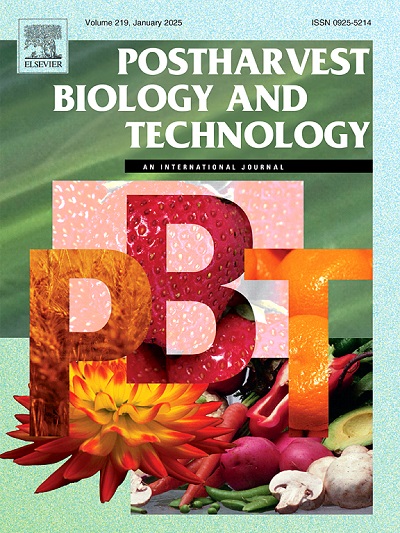1-Methylcyclopropene alleviates peel greasiness by regulating wax composition and microstructure of ‘Yuluxiang’ pears during storage
IF 6.4
1区 农林科学
Q1 AGRONOMY
引用次数: 0
Abstract
The greasiness of ‘Yuluxiang’ pear rapidly increases following the transition from cold storage to ambient temperature storage, severely affecting the pear fruit’s appearance and commercial value. Therefore, it is important to develop new techniques to inhibit pear greasiness during storage. In this study, ‘Yuluxiang’ pears were subjected to a 24 h of fumigation with 1.0 μL L−1 1-methylcyclopropene (MCP). Subsequently, the pears were stored at 0 °C for 120 and 180 d, followed by a seven-day storage at 20 °C. Results showed that 1-MCP postponed the onset of peel greasiness. Moreover, it slowed the cracking of the pears’ cuticular wax layer and the exposure of crystal microstructure. At the same time, it inhibited the increase in the contents of (E)-β-famesene, α-farnesene, docosanol, stearic acid and hexadecanoic acid. 1-MCP suppressed the CO2 and ethylene production rate (EPR) of the pears during the 120 d of cold storage and the subsequent seven-day storage at 20 °C. Correlation analysis found a positive correlation between EPR and the content of ester compounds in the peel wax. Thus, 1-MCP may inhibit the accumulation of wax compounds and EPR, thereby suppressing the occurrence of peel greasiness. Furthermore, molecular analysis showed that 1-MCP suppressed the upregulated expression of PyLACS9 and PyFAD2 throughout the storage period, and markedly inhibited the upregulated expression of the PyACO2 during the ambient temperature storage. Since PyLACS9 and PyFAD2 play crucial roles in regulating the extension and degradation pathways of fatty acids, it was suggested that 1-MCP may suppress the accumulation of wax components and the occurrence of greasy peel by inhibiting the up-regulated gene expression of PyACO2, PyLACS9 and PyFAD2.
求助全文
约1分钟内获得全文
求助全文
来源期刊

Postharvest Biology and Technology
农林科学-农艺学
CiteScore
12.00
自引率
11.40%
发文量
309
审稿时长
38 days
期刊介绍:
The journal is devoted exclusively to the publication of original papers, review articles and frontiers articles on biological and technological postharvest research. This includes the areas of postharvest storage, treatments and underpinning mechanisms, quality evaluation, packaging, handling and distribution of fresh horticultural crops including fruit, vegetables, flowers and nuts, but excluding grains, seeds and forages.
Papers reporting novel insights from fundamental and interdisciplinary research will be particularly encouraged. These disciplines include systems biology, bioinformatics, entomology, plant physiology, plant pathology, (bio)chemistry, engineering, modelling, and technologies for nondestructive testing.
Manuscripts on fresh food crops that will be further processed after postharvest storage, or on food processes beyond refrigeration, packaging and minimal processing will not be considered.
 求助内容:
求助内容: 应助结果提醒方式:
应助结果提醒方式:


